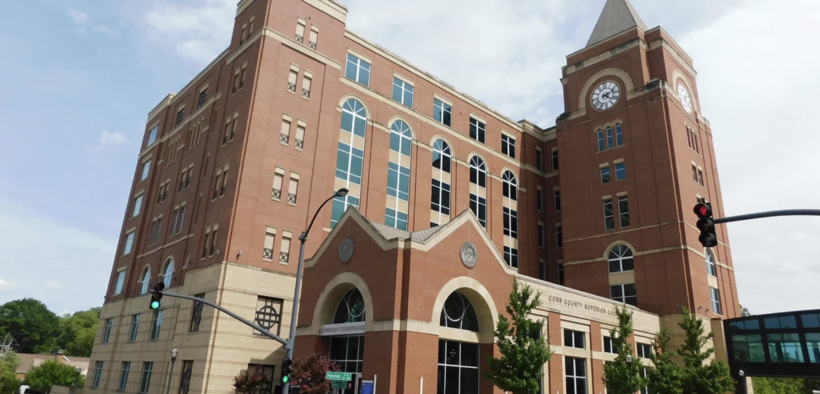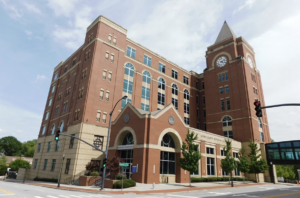187 Churches Sue North Georgia Conference
Largest lawsuit of its kind

More than 180 churches have joined together to sue the North Georgia Conference and its leaders, seeking to leave The United Methodist Church with property.

The lawsuit — filed by 186 churches late March 30 in Cobb County Superior Court in Marietta, Georgia — involves more than a quarter of the North Georgia Conference’s nearly 700 congregations.
It’s also the most congregations that have banded together in a single lawsuit since the denomination began undergoing a slow-motion separation after decades of intensifying debate over LGBTQ issues.
The lawsuit responds to the North Georgia Conference leadership’s decision late last year to suspend the disaffiliation process under church law, citing widespread “defamatory” misinformation. The leaders said that the conference would revisit the disaffiliation process after the next General Conference, the denomination’s top lawmaking assembly now scheduled for April 23-May 3, 2024, in Charlotte, North Carolina.
With that decision, the lawsuit says, conference leaders acted “wrongfully, in bad faith, and … beyond the limits of their power” to deprive the churches of “the right to vote on withdrawal from the UMC with their property intact.”
The churches want the conference to restore its disaffiliation process as well as punitive damages.
The North Georgia Conference faces another similar lawsuit filed Feb. 22 in Columbia County Superior Court by Trinity on the Hill United Methodist Church in Augusta, Georgia.
The underlying issue is The United Methodist Church’s trust clause, which states that all church property is held in trust for the entire denomination. Methodism’s founder John Wesley instituted the church’s first trust clause, which The United Methodist Church and its predecessors have maintained since the 18th century.
Access to MinistryWatch content is free. However, we hope you will support our work with your prayers and financial gifts. To make a donation, click here.
Both lawsuits come as the clock is ticking on a church law — approved by the 2019 special General Conference — that offers U.S. congregations a limited release from the trust clause if they meet certain conditions.
Those requirements include at least a two-thirds vote for disaffiliation by the congregation and majority approval by its annual conference, which consists of voting members from multiple congregations. The church law, Paragraph 2553 in the denomination’s Book of Discipline, is set to expire at year’s end — months before the coming General Conference.
Already, U.S. annual conferences have approved the withdrawal of 2,095 congregations since the church law took effect four years ago. That total, representing about 7% of U.S. United Methodist churches, includes 71 church disaffiliations that the North Georgia Annual Conference approved in June last year.
“The United Methodist Church website specifically states that when General Conference 2024 meets Paragraph 2553 will not exist and therefore, it is not possible to ‘extend’ a provision that does not exist,” the lawsuit states.
The lawsuit names as defendants not just the conference but also its board of trustees; individual district superintendents; its previous bishop, Bishop Sue Haupert-Johnson, who now leads the Virginia Conference; and current Bishop Robin Dease, who took office Jan. 1.
Dease released a statement about the lawsuits March 31 after surveying tornado damage in the conference. In the statement, she said, conference leaders worked diligently to implement a disaffiliation process in line with church law.
“However, the cabinet discovered and observed that many local churches have been misled about the disaffiliation process and have been presented with information about the process, and about The United Methodist Church and its leadership, that is factually incorrect and defamatory,” she said. “We have significant concerns about this misinformation and are well aware that it has the potential to do irreparable harm.”
She went on to say that the information presented “has been antithetical to the concept of a gracious exit or a commitment to honoring the mission and ministry of all Christians.”
Her statement also included a lengthy question-and-answer section about the reasoning behind blocking disaffiliation that the conference also included in its December announcement.
The conference’s pause on disaffiliations came after months of what a number of church leaders decried as false, negative rhetoric about the future United Methodist Church from those recruiting for the Global Methodist Church — a breakaway conservative denomination that launched in May last year.
That misinformation includes allegations that The United Methodist Church is abandoning core doctrines of the Christian faith such as the divinity and resurrection of Christ, which United Methodist churches around the globe will celebrate this coming Easter Sunday.
Members of the Wesleyan Covenant Association, the traditionalist advocacy group that organized the new Global Methodist Church, dispute claims of dishonesty.
Representing the 186 churches in the North Georgia lawsuit is Dan Parr, president of the North Georgia Wesleyan Covenant Association chapter, and David Gibbs III, president of the National Center for Life and Liberty.
“Our goal is simple: We request that the North Georgia bishop, trustees and cabinet restore the processes that were in place last year which allowed 70 churches in the North GA Annual Conference to disaffiliate,” Gibbs told United Methodist News by email.
“The churches attempted to address their differences in a respectful, Christ-centered way by coming to the table together to find amicable solutions,” he added. “The conference has not respected the churches and responded timely to their requests.”
The National Center for Life and Liberty, a non-Methodist legal nonprofit that has been working with the Wesleyan Covenant Association on legal strategy, is representing the churches in lawsuits against other conferences.
Gibbs said the center represents about 2,000 United Methodist churches across the U.S. that are working toward disaffiliation.
The center has been involved in lawsuits filed by 106 churches against the Florida Conference and by 38 churches against the Baltimore-Washington Conference. Both of those lawsuits seek to release churches from the trust clause without meeting the obligations under Paragraph 2553. Those lawsuits are ongoing, but 40 of the Florida churches have since withdrawn from the litigation.
A North Carolina judge on March 20 dismissed a similar lawsuit brought by 36 churches also represented by the National Center for Life and Liberty. The center plans to appeal.
Conferences across the United States also are dealing with other lawsuits brought by individual churches not represented by the center.
A Louisiana judge on March 23 dismissed a very different kind of suit brought by a group of retired United Methodist pastors seeking to halt church disaffiliations. The judge ruled that in administering disaffiliations, the Louisiana Conference is protected by the U.S. Constitution’s separation of church and state.
The United Methodist trust clause has withstood various challenges over the years. Last year, a Wisconsin federal judge dismissed a lawsuit brought by a church in Fort Atkinson, Wisconsin, writing that under neutral principles of law, the church would not retain its property.
The North Georgia Conference recently faced another legal dispute involving the departure of Mt. Bethel Church, a member of the Wesleyan Covenant Association. The conference and congregation reached a settlement last year that saw the megachurch paying $13.1 million to the conference trustees to leave The United Methodist Church with property and become independent.
Mt. Bethel subsequently left the denomination, and some members have left to found Grace Resurrection Methodist Church, another independent congregation.
In her statement, Dease said conference leaders “are prayerfully exploring the best methods for moving forward and next steps available as set forth in the Book of Discipline. Given the circumstances, this approach is the most gracious available to us.”
This article was originally published by UM News.
Main photo: Cobb County Superior Courthouse in Marietta, Georgia / Photo by Jimmy Emerson, DVM via Flickr.



